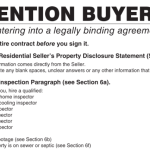How you use concessions in real estate can be absolutely critical to your success when making an offer.
Without exaggeration: concessions can help you afford the perfect home. And not knowing how to use concessions may keep you from realizing that dream.
What Are Concessions in Real Estate?
Let’s start with the root of the word: concede. Think of concessions as a way for the seller to give up, or yield, important things to you as a buyer, so that you can make the deal work.
Sellers know that buying a home can be stressful and expensive. So in order to make their home appealing to you, they may offer things that help you ease into homeownership. Or, you may have to negotiate for them.
Concessions in real estate can take many forms. For example, sellers may:
- Reduce the price of the home
- Pay for your appraisal
- Pay for your home warranty
- Make repairs to the home, so that you don’t have to worry about fixing things right away
- Give you a fridge, washer, and dryer, and even furniture
Most importantly, sellers can give you money at closing, to help pay for costs related to the transaction.
Why Money at Closing Matters
For most buyers, you’ll have to make some sort of down payment on the home. But what isn’t included in your down payment is closing costs. Buyers are sometimes surprised to learn that the 3 or 3.5% they saved for a down payment is not enough, because they also need to pay for closing costs. Since closing costs are thousands of dollars, a deal may die unless the sellers are willing to offer to help cover them.
This is where seller concessions can come in to save the deal. A seller may give you, the buyer, enough money at closing to cover the closing costs. If you’ve ever heard that the seller is “covering closing costs” – this is also known as seller concessions.
Limits on Concessions
As long as the seller can afford to sell the home for less, it is always possible that the seller can reduce the price of the home. However, in most cases, there are limits to how much a seller can contribute to your closing costs.
If you are buying a home with cash, you can request any amount of seller concessions. And if the seller agrees, you can get that money at closing.
However, for financed purchases, lenders typically impose limits on seller-paid concessions. These limits are usually between 3% and 6% of the purchase price, and occasionally up to 9%. The amount you can receive often depends on your down payment, as well as the type of loan product you are using.
When it comes time to asking for concessions in an offer, it’s important to speak with your lender to learn how much money in concessions would be helpful for your situation.
How to Use Concessions
Once you secure seller-paid concessions, how can you use them effectively? Your lender can help you explore options, but common uses include:
- Covering Closing Costs: This is a smart strategy when cash is tight, as it minimizes your immediate out-of-pocket expenses. Closing costs are on top of the purchase price of the home, so it’s often a good idea to get them paid for, if possible.
- Buying Down Your Interest Rate: Using concessions to buy down your interest rate can significantly lower your monthly mortgage payment. For instance, a 1% reduction in interest rates can save you more than a 10% reduction in the purchase price would!
Creative Strategies with Concessions
If you are getting a loan on a home, negotiating for seller concessions may be a way to get everyone what they want.
Example:
- A seller needs to sell a home for $500,000 in order to get enough money from the sale to buy the next home.
- The seller has the home listed for $500,000. The seller believes he cannot afford to help you with closing costs.
- You need concessions, because you don’t have enough cash on hand to cover both the down payment and costing costs.
- You may offer $510,000 on the home (more than it is listed for), and request $10,000 in closing costs.
- This approach helps the seller meet their financial goals while allowing you to purchase the home with less cash upfront.
Conclusion
It’s easy to approach a home purchase and ONLY look at the purchase price. But especially if this is your first home, the price is not always the most important factor to consider.
I love taking the time to learn about your financial situation, alongside your lender, so that I can keep your goals at the forefront of any offer that you make. That way, your goals aren’t lost in the transaction. And, you get a better result because you don’t have to juggle all the details, all the time. When you are transparent about what you want to accomplish, I can help you structure a deal that aligns with your goals (knowing that sometimes goals change).
Are you looking for a dedicated Realtor to help you navigate concessions in real estate and structure a home purchase that works for you? Contact John Harding at 480-639-9640 today!





